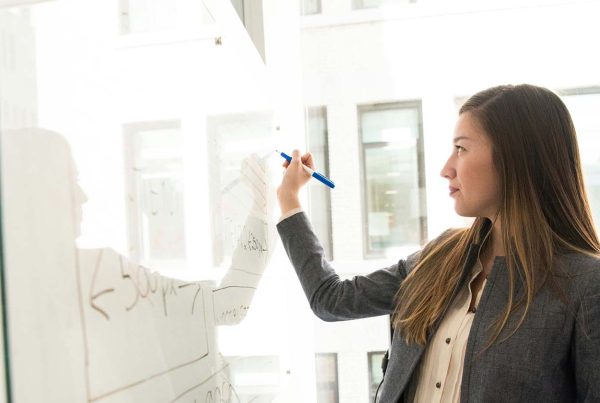Oxford HR worked with Fiona Greig, CEO of Link Education, in 2020 in the search for their Ethiopia Country Representative. This was already a challenging recruitment and the process was further complicated by the global outbreak of Covid-19. Oxford HR also worked with Sabre Education in the search for their new CEO during the pandemic, and we’ve been able to draw interesting conclusions using our candidates and clients’ experience of recruiting and onboarding virtually.
Key Takeaways:
- More dialogue is needed when face-to-face interviews are not available
- Virtual processes have the opportunity to be more inclusive
- Having the right people in your team is vital when travel and in person meetings are not a possibility
- Organisations need to invest into IT infrastructure to ensure that global teams are all equally connected
‘It affected everything.’
Interviewing is one of the key stages in any recruitment process, and when we think of Covid-19, web-based interviews are often one of the first things that springs to mind. In the case of Link Education, Fiona mentions that it was always the intention to have the Country Representative interviews in person, which was not a possibility a few months down the line.
However, Fiona notes that Oxford HR had given Link Education a good steer on the applicants for the role, and that the candidate summaries and longlist notes were found to be incredibly useful, especially when face-to-face contact, or ‘normal filters’ are not a possibility.
‘We felt there was a really good understanding of what was needed.’
As the pandemic progressed, it became clear that shortlisted candidates would be unable to travel to the main office in Edinburgh for interview. The preferred candidate, Nicolo di Marzo, was also prevented from travelling to Edinburgh for his induction. He started working with Link remotely from his base in Sicily, and continued this way for his first four months in the post.
‘It’s a bit strange speaking to somebody every day, having recruited someone when you’ve never actually physically met them. We were very keen that Nicolo felt integrated and part of the Edinburgh team. We had a welcome event and quiz on teams. Right from the start we tried to really make him feel part of the team.’
Fiona also notes that it helped that, by that point, the rest of the team were also working remotely. Had the team been sitting in the office, they might not have thought to include Nicolo in all conversations, but these conversations were happening remotely, which was a leveler. In this sense, Nicolo was able to connect with colleagues both in Ethiopia and in Edinburgh.
Fiona also says that historically, in-country issues would have been resolved by herself or colleagues travelling to the country, which was impossible due to Covid travel restrictions. One of the main learnings, she notes, is to ensure that the in-country teams are truly autonomous and have the right people in place. By building better teams and boards, travel from head office can be substantially reduced.
Another point Fiona mentions is the impact of IT infrastructure, and how software like Teams and Zoom allowed greater collaboration amongst distanced teams, compared to a previous, more top-down approach. Again, this reinforced the importance of having the right people in place, so that remote teams can be fully autonomous.
David Main, Board Chair of Sabre Education, made similar conclusions of his experience of recruiting during the pandemic. He states that the big restriction was ‘it took away the benefit of face to face.’ Sabre came up with two innovative approaches to mitigate this. In addition to a panel presentation at final round, the shortlisted candidates had a series of one to one conversations, with each of the Trustees, with the outgoing CEO, and with two members of the senior leadership team. This allowed the appointing panel members to form a much more rounded view of the candidates, despite not being able to meet in person.
As Susan Place Everhart, the placed candidate for the role noted, it was a good experience for both parties. ‘That was a benefit for me because I learned a lot from different board members about different aspects of the organisation, what their emphasis was and what their priorities were. I felt that that was a great way to do things.’
The second consideration was for David to take a ‘side by side walk’ with the chosen candidate; where parties could maintain social distancing whilst still undertaking the crucial ‘chemistry check.’
Susan speaks highly of being able to meet David, even if via socially distanced walking.
‘I feel that virtual is fairly good. It’s not the same, but it’s fairly good.’
When reflecting on her on-boarding into her new role, Susan says she had to think creatively. Although she had already chatted to most people at Sabre Education, she notes that, by joining an organisation virtually, you miss observing key interactions within the team that provides context.
‘That’s a challenge, especially for a new CEO coming in where it’s all about getting to know your team as part of the first 100 days.’
Further to this, Susan also notes that a big challenge was connectivity issues, especially with regards to Ghana. Whilst the time had been made for the meeting, and all the members were there, the meetings were often punctuated with somebody freezing or dropping out due to their internet signal. Internet connectivity challenges between international colleagues are not new, but during Covid, they even extended to teams who would otherwise have met in person for these meetings.
‘There are strains on individuals and there are strains on organisations.’
And looking forward, David mentions that within both the Education space and the wider NGO sector, there will be a greater need for people who understand technology, in order to solve issues, in addition to coming up with creative frameworks that will put organisations in good stead coming out of the pandemic. Susan notes this too, and offers a silver lining of Covid-19 in the light shed on inequalities with regards to technology and connectivity; the charity sector works with the most vulnerable, the most rural and potentially, the most unconnected. How can we make sure we’re choosing solutions that don’t leave anyone behind?
‘Covid hasn’t ended, so it’s good to find go-to solutions.’



